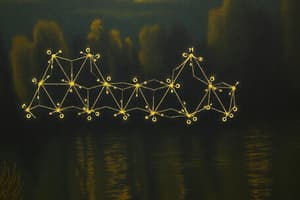Podcast
Questions and Answers
When forming an ionic bond, what happens to the valence electrons of the atoms involved?
When forming an ionic bond, what happens to the valence electrons of the atoms involved?
- They become free electrons in the compound
- They are transferred permanently (correct)
- They are shared equally
- They are gained by both atoms
In the formation of ionic compounds, what kind of elements typically participate in the bonding process?
In the formation of ionic compounds, what kind of elements typically participate in the bonding process?
- Metals and nonmetals (correct)
- Only metals
- A metal and a noble gas
- Only nonmetals
What type of ion does an atom become when it loses electrons in an ionic bond?
What type of ion does an atom become when it loses electrons in an ionic bond?
- Covalent ion
- Cation (correct)
- Anion
- Noble gas ion
In the compound sodium chloride, what is the charge on the sodium ion?
In the compound sodium chloride, what is the charge on the sodium ion?
What type of bond is formed due to the electrostatic attraction between oppositely charged ions?
What type of bond is formed due to the electrostatic attraction between oppositely charged ions?
In an ionic compound, how are multiple cations and anions held together?
In an ionic compound, how are multiple cations and anions held together?
What is the overall charge on an ionic compound like sodium chloride?
What is the overall charge on an ionic compound like sodium chloride?
Which statement best describes the bonding in sodium chloride?
Which statement best describes the bonding in sodium chloride?
'Opposites attract' applies to which type of bonding process?
'Opposites attract' applies to which type of bonding process?
Flashcards are hidden until you start studying



